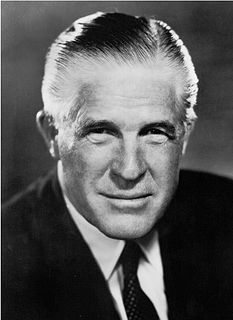A Quote by Barry Goldwater
Today neither of our two parties maintains a meaningful commitment to the principle of States' Rights. The 10th Amendment is not a 'general assumption' but a rule of law. States rights mean that states have a right to act or not to act, as they see fit, in areas reserved to them.
Related Quotes
Abortion is a states' rights issue. Education is a states' right issue. Medicinal marijuana is a states' rights issue. Gay marraige is a states' rights issue. Assisted suicide- like Terri Schiavo- is a states' rights issue. Come to think of it, almost every issue is a states' rights issue. Let's get the federal government out of our lives.
To hold that Congress has general police power would be to hold that it may accomplish objects not intrusted to the general government, and to defeat the operation of the 10th Amendment, declaring that 'the powers not delegated to the United States by the Constitution, nor prohibited by it to the states, are reserved to the states respectively, or to the people.
We passed the Voting Rights Act of Virginia, which restores and builds on key provisions of the 1965 federal Voting Rights Act that was gutted by the United States Supreme Court. Voting is fundamental to our democracy, and this legislation is a model for how states can ensure the integrity of elections and protect the sacred right to vote.
Virginia States' rights, as our forefathers conceived it, was a protection of the right of the individual citizen. Those who preach most frequently about states' rights today are not those seeking the protection of the individual citizen, but his exploitation. The time is long past — if indeed it ever existed — when we should permit the noble concept of states' rights to be betrayed.
[Before the Civil Rights Act of 1964], many governments in southern states forced people to segregate by race. Civil rights advocates fought to repeal these state laws, but failed. So they appealed to the federal government, which responded with the Civil Rights Act of 1964. But this federal law didn't simply repeal state laws compelling segregation. It also prohibited voluntary segregation. What had been mandatory became forbidden. Neither before nor after the Civil Rights Act were people free to make their own decisions about who they associated with.
My friends, to those who say that we are rushing this issue of civil rights, I say to them we are 172 years late. To those who say that this civil-rights program is an infringement on states’ rights, I say this: The time has arrived in America for the Democratic Party to get out of the shadow of states' rights and to walk forthrightly into the bright sunshine of human rights.
Germany doesn't have a Bill of Rights, England doesn't have a Bill of Rights, nobody else has a Bill of Rights. You know, the United States is very unique, and that is in the Bill of Rights and the fact that one third of the population is armed... nobody's armed in Canada, nobody's armed in England, nobody's armed in Germany, it's amazing, the United States is a really stand alone class act.
The U.S.-led western alliance, while acting as an advocate of democracy, rule of law and human rights, is acting from the opposite position, rejecting the democratic principle of the sovereign right of states enshrined in the U.N. Charter and trying to decide for others what is good and what is bad.


































